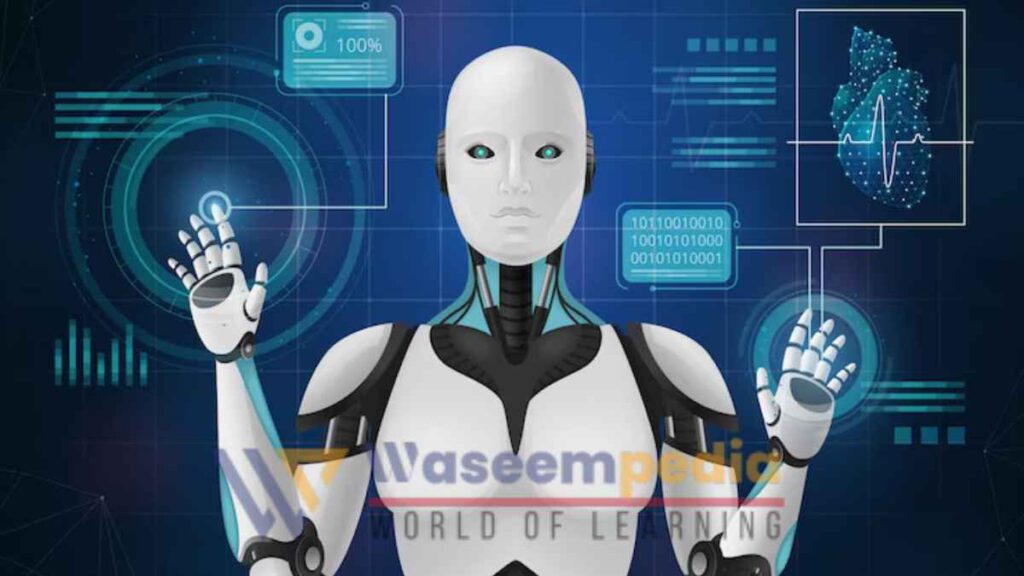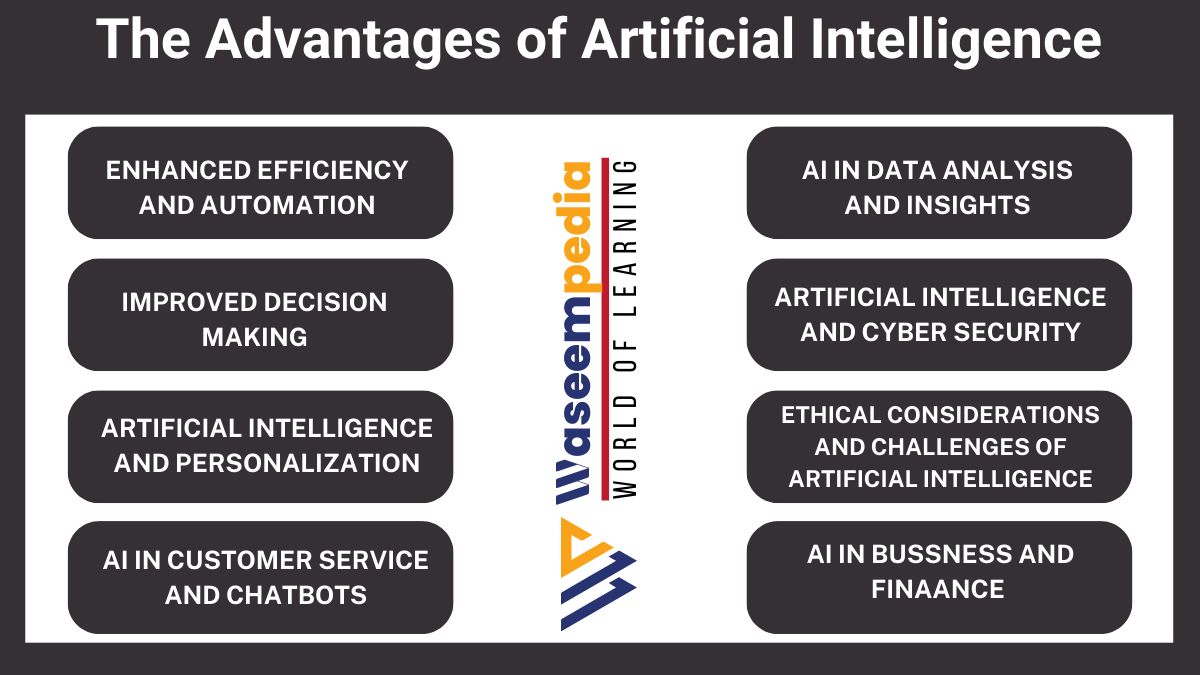Artificial Intelligence offers a wide range of advantages across various industries, revolutionizing processes, decision making, personalization, customer service, data analysis, and cybersecurity. With increased efficiency, improved insights, and enhanced automation, AI has the potential to transform businesses and improve people’s lives. However, ethical considerations must be prioritized to ensure responsible and fair deployment of AI technologies.

Artificial Intelligence (AI) has emerged as a groundbreaking technology with the potential to revolutionize various industries. It encompasses the development of intelligent machines that can perform tasks that typically require human intelligence.
AI has become increasingly prevalent in today’s society, and its advantages are vast and diverse. In this article, we will explore the numerous benefits of artificial intelligence across different sectors and discuss its impact on efficiency, decision making, personalization, customer service, data analysis, cybersecurity, and more.
Artificial Intelligence
Artificial Intelligence refers to the simulation of human intelligence in machines that are programmed to think, reason, and learn. It encompasses a wide range of technologies, including machine learning, natural language processing, computer vision, robotics, and expert systems.

AI aims to create intelligent systems capable of understanding, analyzing, and responding to complex data and situations.
Definition of Artificial Intelligence
Artificial Intelligence can be defined as the development of computer systems that possess the ability to perform tasks requiring human intelligence. These tasks include visual perception, speech recognition, decision making, problem-solving, and language translation. AI systems can learn from experience, adapt to new inputs, and improve their performance over time.
Historical Background of Artificial Intelligence
The concept of artificial intelligence dates back to ancient times, but significant advancements have been made in recent decades. The field gained momentum in the 1950s, with pioneers like Alan Turing and John McCarthy laying the foundation for AI research. Over the years, AI has progressed rapidly, leading to breakthroughs in areas such as deep learning, neural networks, and autonomous systems.
13 Advantages of Artificial Intelligence
13 Advantages of Artificial Intelligence are as following.
1. Healthcare
AI has the potential to revolutionize healthcare by improving diagnostics, treatment planning, and patient care. Intelligent systems can analyze medical data, assist in early disease detection, recommend personalized treatment plans, and even perform surgical procedures with precision. AI-powered technologies can enhance healthcare outcomes, reduce errors, and alleviate the burden on healthcare professionals.
2. Finance
In the financial sector, AI is transforming operations, risk management, fraud detection, and customer service. Machine learning algorithms can analyze vast amounts of financial data to detect patterns, identify potential risks, and make accurate predictions. AI-powered chatbots enable personalized customer interactions and provide round-the-clock support, enhancing customer satisfaction.
3. Education
Artificial Intelligence is revolutionizing education by enabling personalized learning experiences. Intelligent tutoring systems can adapt to individual students’ needs, provide tailored feedback, and offer additional resources.

AI can also assist in automating administrative tasks, such as grading, allowing teachers to focus more on student engagement and instructional design.
4. Manufacturing
AI-powered robotics and automation have greatly improved manufacturing efficiency and productivity. Intelligent machines can perform repetitive tasks with precision, reduce errors, and enhance overall production quality. AI-enabled predictive maintenance helps detect equipment issues in advance, preventing costly downtime and optimizing operations.
5. Enhanced Efficiency and Automation
One of the primary advantages of artificial intelligence is its ability to enhance efficiency and automate tasks. AI systems can process large volumes of data quickly and accurately, freeing up human resources for more complex and creative endeavors. Automation through AI can lead to significant time and cost savings, streamlining processes and increasing productivity.
6. Improved Decision Making
Artificial Intelligence enables organizations to make more informed and data-driven decisions. AI algorithms can analyze complex datasets, identify patterns, and provide valuable insights. This allows businesses to anticipate market trends, optimize resource allocation, and make strategic choices based on accurate predictive analytics.
7. Artificial Intelligence and Personalization
With AI, businesses can deliver personalized experiences to their customers. Machine learning algorithms analyze user preferences, behavior, and historical data to tailor recommendations, offers, and content. Personalization not only enhances customer satisfaction but also increases engagement and drives sales.
8. AI in Customer Service and Chatbots
Artificial Intelligence has transformed customer service through the implementation of chatbots and virtual assistants. These AI-powered conversational agents can handle customer inquiries, provide support, and offer personalized recommendations. Chatbots are available 24/7, providing prompt responses, reducing customer waiting times, and improving overall customer experience.
9. AI in Data Analysis and Insights
The vast amount of data generated by businesses today can be effectively analyzed and turned into valuable insights using AI technologies. Machine learning algorithms can uncover hidden patterns, correlations, and trends within large datasets, enabling organizations to make data-driven decisions. AI-driven analytics provide a competitive edge by identifying opportunities and optimizing business strategies.
10. Artificial Intelligence and Cyber security
As the digital landscape evolves, so do cyber threats. Artificial Intelligence plays a crucial role in cybersecurity by detecting and mitigating potential risks. AI algorithms can identify anomalies, predict attacks, and respond in real-time, bolstering the security posture of organizations. Intelligent cyber security systems continuously learn from new threats, adapting and improving their defense mechanisms.
11. Ethical Considerations and Challenges of Artificial Intelligence
AI brings numerous advantages, it also raises ethical concerns and challenges. Issues such as privacy, bias, accountability, and job displacement need to be addressed. It is crucial to develop ethical frameworks and regulations to ensure the responsible and fair use of AI technologies.
12. Overcoming the Challenges
Addressing the challenges associated with artificial intelligence requires collaboration between policymakers, researchers, and industry experts. By implementing transparent algorithms, data privacy measures, and responsible AI practices, we can harness the full potential of AI while mitigating its risks.
13. The Future of Artificial Intelligence
The future of artificial intelligence is promising, with continuous advancements and innovations on the horizon. AI is expected to further augment human capabilities, driving innovation across industries. As the technology matures, it will be crucial to ensure its ethical development and foster trust between humans and intelligent machines.
Related FAQ’s
What are the five advantages of artificial intelligence?
Automation: AI enables the automation of repetitive tasks, leading to increased efficiency and productivity in various industries.
Decision-making: AI systems can analyze vast amounts of data and make data-driven decisions faster and more accurately than humans.
Personalization: AI enables personalized experiences in fields like marketing, healthcare, and entertainment, tailoring products and services to individual preferences.
Continuous learning: AI systems can improve over time through machine learning algorithms, adapting and refining their performance with more data.
Safety and exploration: AI can be utilized in hazardous environments and space exploration,
What are 4 uses of artificial intelligence?
Natural Language Processing (NLP): AI for understanding and generating human language, powering virtual assistants and chatbots.
Image and Speech Recognition: AI analyzes images and recognizes patterns, used in facial recognition and speech-to-text applications.
Predictive Analytics: AI processes data for data-driven decisions, forecasting trends, and improving efficiency.
Healthcare Diagnostics: AI aids in medical imaging for disease diagnosis, like X-rays and MRIs interpretation.
What are the popular five application of AI?
AI and finance go hand in hand! In finance, AI does automation, chatbots, smart learning, algorithm trading, and machine learning. It’s making finance faster and smarter!
Who is the father of AI?
John McCarthy is known as the father of AI because he did really important stuff in this field. He was an American computer scientist who came up with the term “artificial intelligence” in 1955. That’s when people started studying how to make machines smart. McCarthy was a pioneer in creating a special computer language called Lisp, which became super important for AI research. His work made AI grow as a science and be used in many industries today.
What problem can AI solve?
AI can solve a wide range of problems, like automating repetitive tasks, predicting outcomes, diagnosing diseases, analyzing large datasets, and assisting in decision-making processes.

